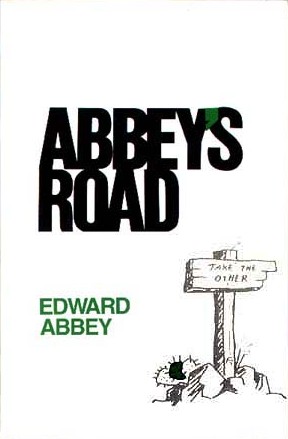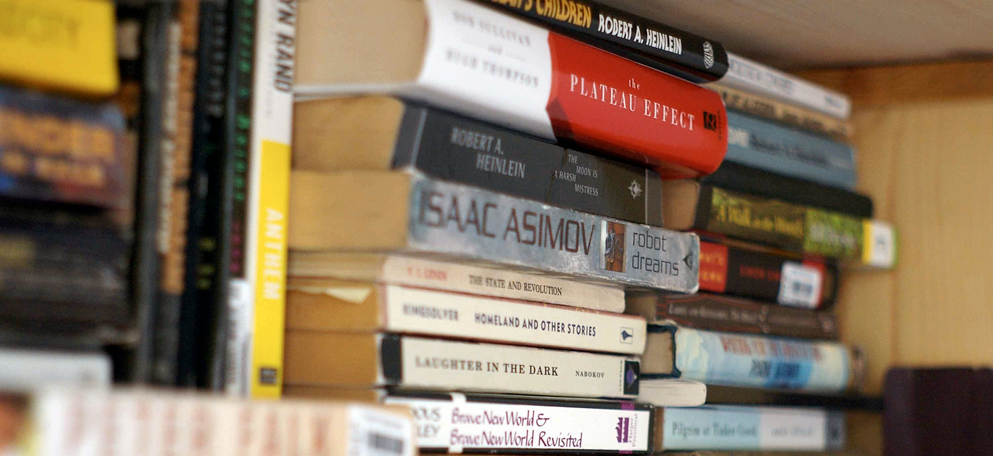
In the spirit of Desert Solitaire and The Journey Home, Abbey's Road is a personal odyssey. Eward Abbey's explorations include the familiar territory of the Rio Grande in Texas and Canyonlands National Park and Lake Powell in Utah. He also takes us to such varied places as Scotland, the interior of Australia, and the Sierra Madrea and Isla de la Sombra in Mexico.
Quotes and thoughts while reading:
... We write in order to share, for one thing - to share ideas, discoveries, emotions. Alone, we are close to nothing. In prolonged solitude, as I've discovered, we come very close to nothingness. Too close for comfort. Through the art of language, most inevitable of the arts - for what is more basic to our humanity than language? - we communicate to others what would be intolerable to bear alone. (p xxiii) Abbey's Confessions of a Literary Hobo starts the book off in a great light. I haven't read any Edward Abbey before this, and was really excited by the last page of intro, because it captured all the reasons Abbey is/was a writer. It felt like a confession, a welcomed real confession.
"We started in the dark at San Francisco's International Airport in the midst of an oppressive metallic uproar - jets like wounded dinosaurs bellowing around us - then lunged upward into deeper darkness where we hung, not moving at all for all I know, for about three and a half hours until we descneded into the clammy balm of Honolulu. A pause. After the stop, the processing was resumed through the longest night anyone ever paid food money to endure. We sat or lounged or lay huddled in this darkened aluminum cigar-shaped capsule while the space transformers whined steadily beyond the insulated walls... Not a journey, not a flight, but simply the transference of human bodies from one point to another by geometrical theorem, or what Ortega y Gaset called "the annihilation of distance." By which process some small but maybe critical element of the human spirit is also annihilated (how annihilate distance without damaging time?), day and night extinguished by our crossing of the international date line. There is no sensation of significant movement in such a mode of transportation; therefore, no sense of travel.
What we have accomplished through jet-engine aircraft is the abolition of the journey. Next time I'll go by sea - or not go at all. Why I've seen more of the world in a subway train from Hoboken to Brooklyn than I saw in that aerial shuttle through the Pacific night." (p 3-4) Whew. I think I initially wanted to share this slice of the book because the imagery of the airplanes was so vivid and well done. But as I kept reading, as is often the case with Abbey, more and more keeps getting added, and I want to share all of it. Form the beautiful writing of the airplanes, we dump in the philosophical debate of the journey, and the difference between that and travel. Abbey's is really great to read for this reason, as he thought deeply, about even the simplest of actions.
OK, so to counter almost everything I wrote above, what the hell was Abbey thinking taking a Ford Falcon into the bush, driving through rutted roads(Back of Beyond pages 46-68)? Did he just think he was above it all? Only saying he was going to rent it for a few days, then take it out for seemingly weeks? It just strikes me as an incredibly entitled thing to do. Added to that, he cracks the oil pan, overheats the engine, gets it towed(which invariably results in flipping and dragging the car a few miles), and then drops it off as is nothing happened. I will give him this, his trip, and scheme to get through the restricted / non-travel area was fun to read about. His capacity to just stop and camp, then to explore the surrounding areas made me a bit jealous, and instilled the travel bug in me. It's a great story, I haven't done enough Abbey reading(or research) to know when he is embellishing, and when he is telling the truth, so maybe he isn't as bad as I thought. He was certainly a man who knew how to take a journey.
Abbey also goes on to talk about State / National parks, and the unending ribbons of roads that keep getting built into them, to allow easier access. This is a conversation between Abbey and his 9 year old daughter.
"'How do you expect people to get in there if they don't have a good road?'
'They can walk.'
'Suppose they're too old to walk? Too young? Too fat, thin, arthritic, decrepit, scared, ignorant, lazy, rich, poor, dumb? How about crippled war veterans who fought for their country - are you going to deny them the right to see the Confluence Overlook from the comfort and convenience of their Ford LTDs?'
'Everybody can't have everything.'" (p 116) It's interesting reading this, and then thinking back to conversations I've had with Mike Polermo, who was an avid Abbey reader. A lot of his viewpoints and arguments make perfect sense now. I don't know where I stand on this anymore. I think one needs to apply a bit of common sense to it all. You can't make access available everywhere, but the places you can, we definitely should. Yosemite has been built up into this tourist attraction, with busses that whiz by and give tours. That's fine, we've sacrificed that natural beauty to allow others to interact with nature. And since we've given that up, we should reserve and hold dear places that we won't allow everyone to travel to, leave places as difficult to experience. I think back to The Circle, when they were putting cameras on everyone for the sake of helping people experience sports and activities (like kayaking for someone in a wheelchair), and how creepy and weird it sounds. Nowadays, I feel like privacy and solitude are rare. Uh-oh, I don't sound like much of a communist anymore.
I know some of this is fiction, and even the stories that are presented as truth have a fair amount of fiction mixed in, but when Abbey throws a beer can into the lake on page 118, I was enraged. Come on, what the hell is that?
"Fools talk of leaving the earth, launching themselves by space shuttle and revolving cannisters of aluminum into permanent orbit somewhere between here and the moon. God speed them. While others plan the transformation of the earth through technology into a global food factory, fusion-powered, computer-controlled, supporting a close-packed semihuman population of 8 billion - twice the number already stifling themselves in the mushroom cities of today(we're at 7.4 billion in 2016 - JK). R. Buckminster Fuller thinks it can be done. Herman Kahn thinks it can be done. Their counterparts in Europe, Brazil, Russia, China, Japan, Uganda, everywhere, think it can be done. And if it can be done, therefore by their logic it must be done. But Kahn and Fuller and their look-alikes are in for many a surprise before the Golden Age of Technocracy encloses us.(It never will. - Edward Abbey) (p 190)
"... Government does not exist to ease, facilitate, moderate, and preside over necessary social change. On the contrary, the purpose of government is to prevent change. At all costs. By any means. That is why government reserves itself the monopoly of coercion, of organized, large-scale violence.
Too much, too much. Too much is enough... Let somebody else save the world for a while; I'm tired of even thinking about it. Not that I seriously imagine myself a thinker. I am a feeler, not a thinker, and proud of it. An extremist? Yes. And a revolutionist? Naturally. Do I advocate another revolution? What do you mean, another? We have yet to see the first. But it's coming." (p 197)
© JKloor 2016 Books
